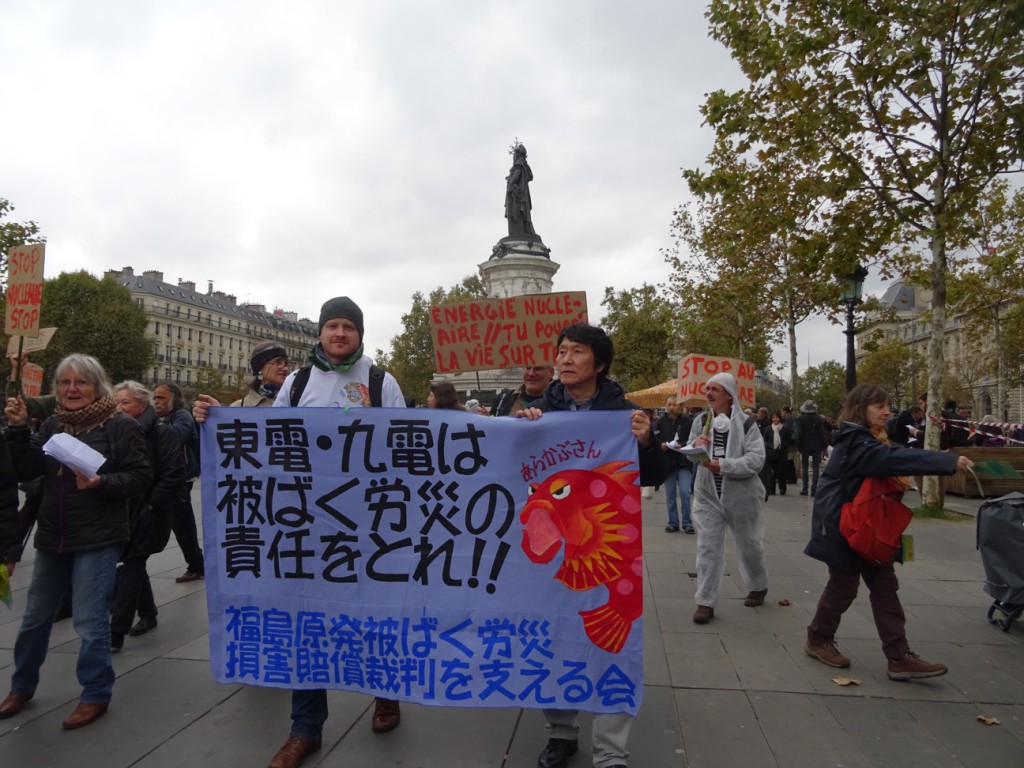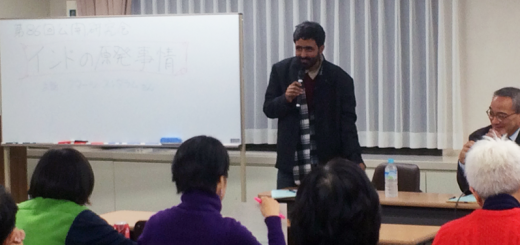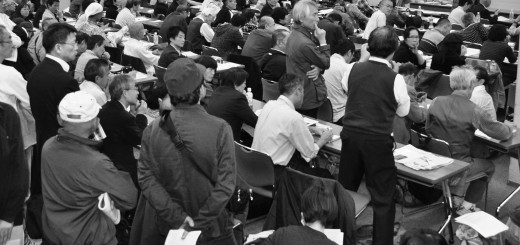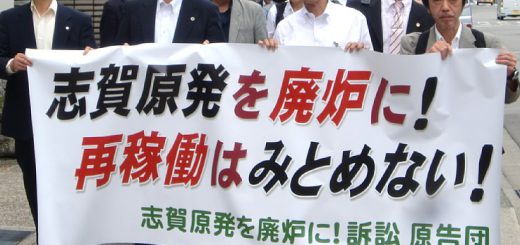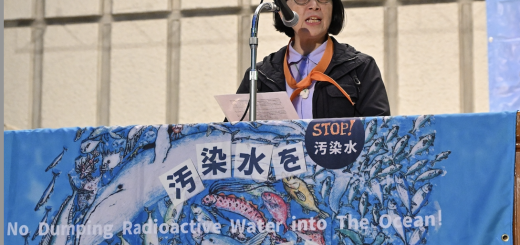Recognition of Exposed Workers in Japan and France: A report on an international survey and participation in the World Social Forum
The number of workers registered under the Exposure Dose Registration and Management System up to just prior to the Fukushima Daiichi Nuclear Power Station (FDNPS) accident was roughly 500,000, but there were a mere 13 cases of recognition of workers’ compensation claims due to exposure. That claims recognitions were so few is not because nuclear power plant work is safe. As well as the difficulty of proving causality between late-onset disorders and work duties in the first place, the hurdle of conditions for recognition are high and not a few people abandon the compensation claim application itself. Even in cases where an exposure accident is suspected, there are a large number of rumors concerning examples of failure to apply due to private settlements in which the power company or employer has made a ‘consolation payment’ to the victims.
Thus far, the government and power companies or nuclear power plant companies have almost totally withheld from publication information on the actualities of health effects or accidents involving workers and even now the realities of the suffering are unclear. In addition to the abovementioned 13 persons recognized, the three persons who received recognition following the JCO criticality accident and four persons whose claims for compensation have been recognized during the work to bring the FDNPS accident to an end and the decommissioning cleanup are included in the list given in Table 1. This table is a CNIC summary based on information gained through surveys of various activist organizations or by negotiation; the government does not publicize data in this form. In particular, it is difficult to get an accurate picture of cases whose claims have not been recognized, and this inhibits discussion of the nature of safety management and recognition for workers’ compensation claims. This is a huge issue that impedes discussions of whether or not nuclear power stations should be tolerated.
Our Radiation-exposed Workers Solidarity Network invited guests from France, Ukraine and South Korea to the first Antinuclear World Social Forum, held in Japan in March 2016, at which an international symposium on the exposed workers issue was held (see Nuke Info Tokyo No.172). It became clear at the symposium that the whole picture of the exposed workers issue was unclear and sufficient efforts had not been made, not only in Japan but also in other countries
From FY2017, we then received a grant from the Takagi Jinzaburo Citizens’ Science Foundation to begin an International Survey on the Work Safety and Compensation System for Nuclear Power Station Workers and the Realities of Exposed Workers’ Accidents (representative, Mikiko Watanabe). This is a comparative survey of the legal system and the realities of safety management and accident compensation claim recognition for nuclear power plant workers in the five countries, France, Germany, Ukraine, South Korea and Japan. The Radiation-exposed Workers Solidarity Network is playing a central role in making efforts for the survey research by cooperating with researchers and specialists on the exposed workers issue inside Japan as well as the joint researchers in each country.
In November of last year (2017), taking the opportunity of the third Antinuclear World Social Forum, held in Paris, four members participating in this international comparative research travelled to France, meeting up with joint researchers from Germany to conduct an interview survey in France. Interviews were conducted with and materials received from a former Alternative Energies and Atomic Energy Commission (CEA) engineer and researcher who was also a former full-time trade union official, a former nuclear power plant worker who is an activist for a workers’ support organization, a sociologist who is a specialist in occupational disease and health issues, and a number of nuclear power plant workers.
In France, employers measure doses received by workers by use of badge dosimeters, which are sent to the state organization L’Institut de Radioprotection et de Sûreté Nucléaire (IRSN) each month for unified management. The employer bears the responsibility for dose management, and the industrial doctor of each employer has access to the doses received by workers and gives advice on employment and work content. The upper limit of worker dose rates is 20mSv in the most recent 12 months, and it is the management responsibility of the industrial doctor to ensure that doses do not exceed this limit.
France regulates occupational diseases caused by 118 kinds of harmful substances, these being summarized in a table, which also includes occupational diseases caused by exposure to radiation. In the case of appearances of the diseases mentioned in the table, if requirements such as time of appearance of the disease are fulfilled and a certificate is issued by an industrial doctor, this is systematically recognized upon application to the local government. Since it is difficult to prove causality between exposure and the onset of disease, “probable cause,” which recognizes the relationship between the disease and the fact of having been present at a nuclear site, is invoked, and if causality is a possibility, this will be recognized even if the person involved is unable to prove causality. There is no regulation defining a certain dose as a condition of recognition, and, for example, if it is known that a person who has contracted leukemia worked at a nuclear power station, causality will be recognized even if the recorded dose is 0mSv. The content of worker claim compensation is roughly the same as that in Japan, and additionally, it is also possible for the worker to initiate a trial to demand further compensation. Trials basically question the employer’s liability for negligence and do not contest the content or causality of an occupational disease that has already been recognized.
As seen above, there are many points which differ from the system in Japan, and especially surprising is that there is no conditional dose for the recognition of exposed workers’ compensation claims and that probable cause is invoked to recognize causality without any further proof.
The French National Health Insurance Fund for Salaried Workers (Caisse nationale de l’assurance maladie des travailleurs salariés / CNAMTS) also publicizes data on the number of cases of recognition of occupational diseases. Around an annual 22 persons recognized as suffering from radiation-induced occupational diseases can be extracted from these statistics in recent years, of which there are around 15 cases per year of cancer (Zerbib Jean Claude, unpublished data). However, not only are the details of each case unclear, it has also been pointed out that there would probably be a larger number of cases if subcontracted workers were included. Further, many workers do not know about the workers’ compensation claim application system and it was thought that actual suffering is therefore not limited to the numbers mentioned above.
Along with a report on the current state of Japan’s exposed workers, we also took with us to France materials on recognition of workers’ compensation claims in Japan (Table 1). Looking at the table, our French interviewees, as well as expressing surprise at the small number of cases recognized in Japan, told us that there was also no published data summarizing exposed workers’ compensation claims in France and pointed out the importance of such a table being drawn up. We hope to further deepen this joint comparative survey research in the future.
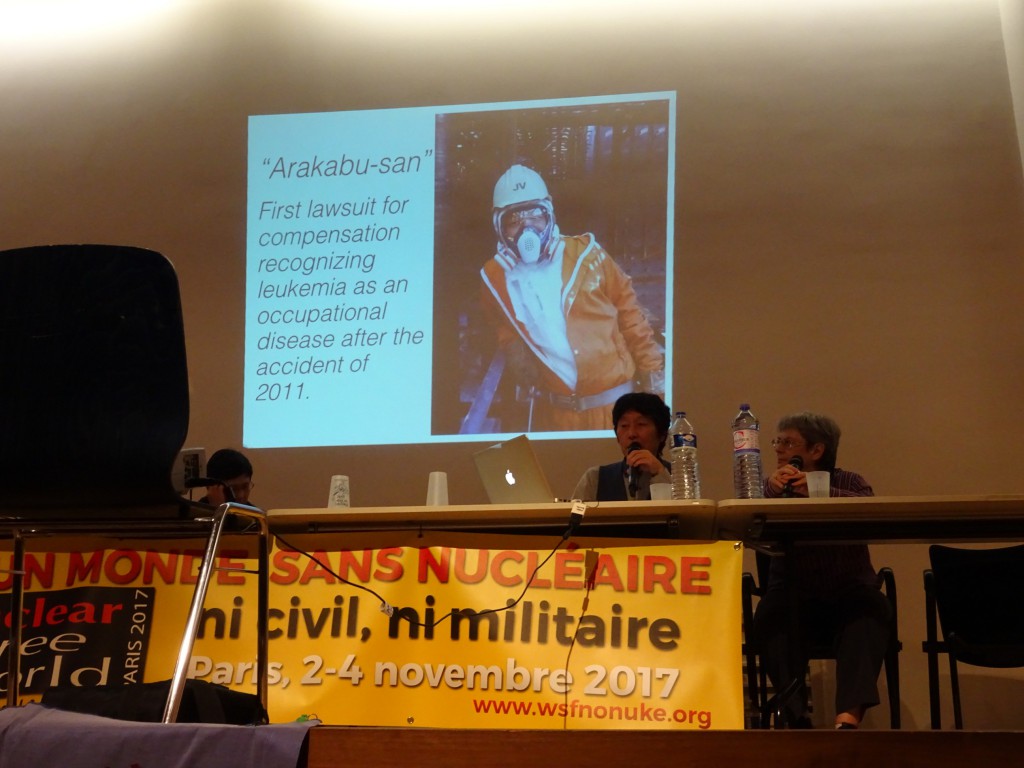
Minoru Ikeda reporting on the “Arakabu-san” compensation trial at a workshop during the Antinuclear WSF
While conducting this survey, we also participated in the third Antinuclear World Social Forum, held in Paris from November 2 to 4. In the forum we organised one joint workshop, and two persons (Minoru Ikeda and Nasubi) gave reports on 1) the work to bring the FDNPS accident to an end and the decommissioning cleanup there and 2) the current state of and worker issues in the decontamination work, engaging in discussion and exchanges of information with the participants from many countries.
In particular, there was high participant interest in the trial initiated by “Arakabu-san,” whose claim for workers’ compensation due to leukemia is the first to be recognized in the post-accident FDNPS operations, and who is now demanding compensation from Tokyo Electric Power Company (TEPCO) and Kyushu Electric Power Company (KYUDEN). The support T-shirts and button badges prepared for the meeting were soon sold out. At the closing meeting on the final day, an international solidarity resolution in solidarity with “Arakabu-san,” demanding compensation for damages from TEPCO and KYUDEN was proposed, and adopted in the joint names of the organizations participating in the forum. I would like to express my gratitude here to the French participants and Ms. Nanako Inaba for preparing and presenting the draft resolution.
